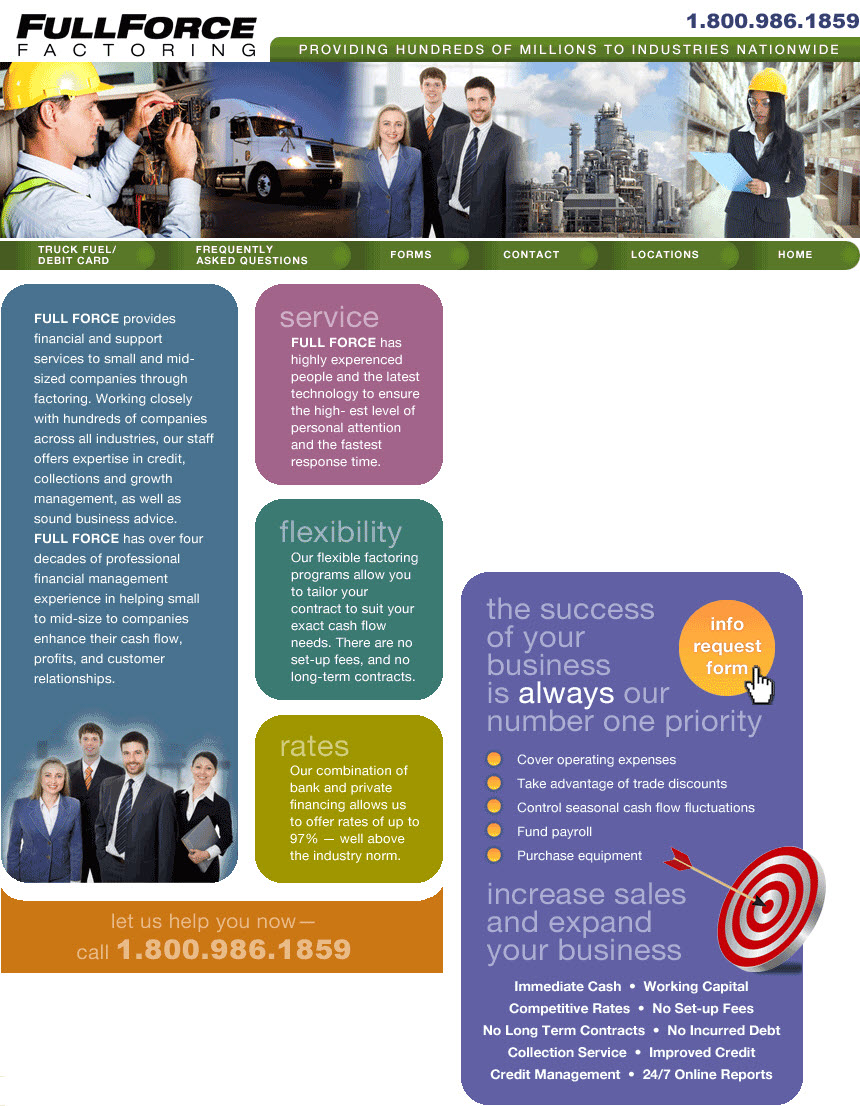
 >
>

 >
>
|
Invoice Factoring- Compared with a bank loan, an invoice discounting arrangement is a individualized contract which takes into account the particular requirements of your business. This is really different from the typical banking documentation used to secure a loan, in which is a typical agreement according to the bank's requirements. In addition, plenty of account receivable factoring companies do not have maximum restrictions. When you have pretty good, creditworthy clients and there are absolutely no legal barriers (like liens, lawsuits or judgments), factoring companies will fund all the receivables you can bring in. This stands out significantly with a usual bank situation, wherein just about every single loan has a maximum limit . A brand-new client is given first approval in under 24 hours, and funds in seven to ten days. By contrast, a loan application to a bank can take as long as 30 to 60 days to cycle through to the loan review committee, with funding to come next in yet another 30 to 45 days. Along with swift resolution time, factoring does not restrict all your firm's assets (just the receivables) or incur debt. Company ownership is not disturbed, keeping your business as liquid as practical, while greatly enhancing your balance sheet and total financial position. In contrast, banks will, in many cases, not only file a lien against (or hold as collateral) most of your business assets, but also against your personal property (including your house, your land, and your lawn mower ). With invoice factoring, no extra debt is accumulated and the credit rating of your company continues to be safeguarded. Quite often a receivable financing arrangement can in fact improve a company's chances of restructuring long-term debt. Since factoring delivers an infusion of funds, the firm is able to pay its bills on time and clear up other remaining credit commitments. Simply speaking, this cash in hand may enable a firm to "get its act together" in a manner that encourages banks and other financing bodies to look more approvingly on either reorganizing debt or financing new property or construction. It's certainly not rare for a really good client to " move onto" to bank lending after a period of "financial adjustment" while receivable factoring. Whilst the benefits of invoice discounting over borrowing money are considerable, the majority of businesses do not have the luxury of same access to both methods of financing. Banks, with their regulatory controls and inherent inflexibility, do not make it very easy for most firms to approach them for financing. Factoring, alternatively, is the purchase of an asset and, therefore, is not regulated by state of federal agencies. Our people often hear business enterprise owners grumble about their banks, and the feeling is constantly the same: the only folks who can qualify for a loan are those who don't need to have one! The First Rules of the Costs of Using a factoring company It costs money. It costs more than bank money. Does it cost much more than investor money? Depends upon how much equity you give up to your investor, and a lot of will need the lion's stake. Still let's stick with the costs of using a factoring company. The Second Rule of the Costs of Invoice factoring It ought to be viewed as a transactional cost rather than interest charged for a time period, for a lot of reasons.
First off, factors need to charge more for the money we advance because the span of time the money is outstanding is so little, usually 30 to 45 days. To charge bank rates on transactions in this short duration benefits only the client; the invoice factoring companies makes no cash, and in truth, would lose his shirt. In the last analysis, you as a businessperson, must ask yourself these two questions:. 1. Will the cash advanced enable me to make even more (one way or another) than the fees charged? 2. Can a factoring company enable me to stay in operation? It's the answer to these that should actually make your verdict for you. Furthermore note that, for the factors that we're familiar with, fees are negotiable. They are a pliable (within reason) part of the contract, but keep in mind, as mentioned, the arrangement must make sense for everyone. We have been known to negotiate with customers that have very special demands or situations, such as: pretty low profit margins, high monthly sales with (shall we say) less-than-creditworthy customers, commitments of ensured monthly volume, capacity for significant expansion with the industry, etc. With regard to these kinds of clients, factoring companies have been known to settle for a high-volume discount schedule.
This is nothing but one good example of just how the schedules could be manipulated to satisfy all involved-- but please be aware of, we factors are more than willing to review, discuss, talk about, think of, and look at each of the opportunities, but they must make sense, i.e., you've got to respect our right to earn a decent fee for the services provided. The rule is simple: the factoring companies discuss a fee schedule that we trust will benefit us both. When, during the course of these negotiations, you believe that you need to have (or are entitled to-- whatever) a lower rate than we're willing to give, or vice versa, we're both free to walk away from the table. Before Proceeding, Feel Great About Your Receivable Financing Company. Keep in mind that as your factoring company is examining you and your customers, you should be checking into your factoring company. Seek references and very carefully look at any deals they may ask you to sign. Very good factoring firms are present to assist you locate solutions to your cash flow concerns whilst offering quality service and charging fair fees. As you go over the documents, ask questions! A pretty good, reputable receivable factoring company will appreciate the time that you are taking to comprehend the process and talk with you to answer any questions you have. Filling out the Application. Some of the most vital records that you will be asked to affix your signature on is a Purchase and Sale Agreement, likewise described as a P&S Agreement. Although a factor's due diligence process is more "client-friendly" than the bank loan process, it could be very really expensive for the receivable factoring companies. |
Factoring At A Top-Rated Factoring Company-FactoringCorp.com
More Factoring Company Articles
Five Excellent Reasons A Company Ought to Factor The Cash Flow Solution Of The Future Is Right here Today-Accounts Receivable Factoring |
|||